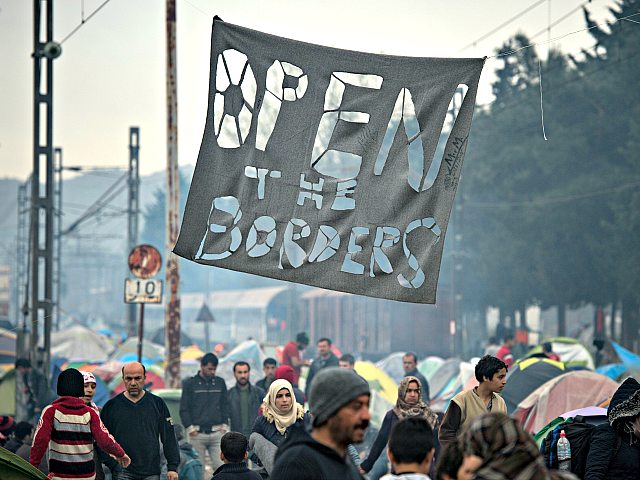Prime Minister Boris Johnson has once again promoted himself as a “pro-immigration politician” and refused to commit to reducing it below its current near-record highs.
“I’m a pro-immigration politician,” the Tory leader declared on the BBC on Friday morning, shaking two clenched fists and adding: “I think immigration can be a wonderful thing.”
Johnson did concede that the current rates “have been very high”, and suggested his administration would be able to “take back control of our borders” in January, at least with respect to Free Movement from the European Union, when he “gets Brexit done” — although if his proposed withdrawal treaty with the EU passes this will be impossible, as it involves signing Britain up to continued Free Movement until at least the end of the so-called “transition” period which it entails.
He claimed that once Britain does have full “democratic control” over its borders, “when it comes to unskilled immigration for people who don’t have a job to come to, we will get the numbers down”.
This somewhat vague commitment leaves all sorts of loopholes which will cause concern to voters, however, offering no assurances on skilled immigration, for which there can be a very low bar, on unskilled immigration for people who do have a job to come to, or on mass chain migration — so-called “family reunification” — of existing migrants’ spouses, parents, siblings, and children.
Indeed, the Prime Minister has already suggested he will quadruple economic immigration to the British countryside, and has dropped the Tory party’s long-standing promise to reduce net immigration “from the hundreds of thousands to the tens of thousands”, offered to voters ahead of the 2010, 2015, and 2017 general elections — but never kept.
Immigration-sceptic think tank Migration Watch UK welcomed the news that Johnson has offered at some commitment to reducing the influx “overall”, but added in a statement seen by Breitbart London that “Delivering on this will take more than vague commitments weeks before an election.”
“Policies currently being proposed are unlikely to lead to a significant reduction,” explained chairman Alp Mehmet.
“Will a future Conservative government maintain present skills and salary requirements, resisting pressure from business to go the other way? Will they include caps in the system, as the Australians do?” he asked.
“Without such measures, up to nine million UK jobs would be exposed to new or increased international competition.”
While a clear majority of British adults wish to see legal immigration reduced, they will have few parties to turn to if they are unsatisfied with his lukewarm commitments to bringing it down — and his total lack of commitment to tackling illegal immigration, which he has suggested he will reward with an amnesty, as he advocated for many years as Mayor of London and Foreign and Commonwealth Secretary.
The opposition Labour Party, for example, has voted at its most recent party conference to not just to allow Free Movement immigration from the European Union to continue, regardless of Brexit, but to extend Free Movement to other countries around the world, shut down all detention centres, and — perhaps not for unrelated reasons — extend the vote to all non-citizens resident in the country; moves Home Secretary Priti Patel believes could increase annual net immigration to an astonishing 840,000 a year.
The reason behind the Tories’ consistent failure to meet its pledges on immigration may be explained by the fact that senior politicians do not really believe in it as their voters do, as revealed by former prime minister David Cameron’s second in command George Osborne after he was expelled from parliamentary politics following the EU referendum.
“[N]one of [the Cabinet’s] senior members supports the pledge [to reduce net immigration] in private and all would be glad to see the back of something that has caused the Conservative Party such public grief,” Osborne wrote in the London Evening Standard in 2017, after its Russian owners made him editor despite having no previous experience in journalism.
“Over the past seven years, the Government has not been able to reduce significantly the numbers of non-Europeans coming here — though we could,” he admitted (emphasis added).
“The damage to the economy from seriously reducing work visas was judged too severe by an expert migration committee; the impact on community relations of further limiting family reunion [chain migration] visas was seen as unpalatable; and few thought we were taking in too many refugees.”
While Osborne as the Remain campaign’s “scaremonger-general” during the EU referendum is no ally of Johnson, who was a leading Leave campaigner, it is perhaps telling that his recommendation to dispense with the “tens of thousands” target entirely has now been implemented.

COMMENTS
Please let us know if you're having issues with commenting.